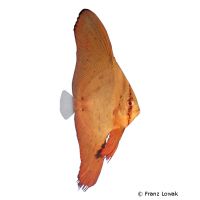Orbicular Batfish (Platax orbicularis)
| Orbicular Batfish Platax orbicularis | |
|---|---|
| Name | Orbicular Batfish |
| Name Lat. | Platax orbicularis |
| Family | Batfishes |
| Family lat. | Ephippidae |
| Order | Surgeonfishes |
| Order lat. | Acanthuriformes |
| Origin | Indo-Pacific, Red Sea |
| Habitat | Coastal waters |
| Diet | Omnivore |
| pH | 8.1-8.4 |
| Hardness | 8-10 °KH |
| Behavior | Peaceful |
| Keeping | Group |
| Reef Compatible | With caution |
| Care Level | Difficult |
| Life Span | N/A |
| Protection | No |
| Metric Units | |
| Size | 50 cm |
| Temperature | 24-28 °C |
| Salinity | 33-36 ‰ |
| Aquarium | ~ 1.700 l |
| US Units | |
| Size | 20" |
| Temperature | 75-82 °F |
| Salinity | 1.020-1.025 sg |
| Aquarium | ~ 450 gal |
Distribution and habitat
The range of Platax orbicularis is the Red Sea, Indian and Pacific Oceans, from the coasts of East Africa to the coast of Central America and from southern Japan to northern Australia and New Caledonia. They live mostly in groups in sheltered coastal waters and lagoons.
Maintenance
They need a high, well structured aquarium with a lot of swimming space and a reef structure (hiding, resting and retreat possibilities) with living stones, which they can graze on (sponges, algae, small crustaceans) and which act like a biological filter as well as free sand areas
Only lime-rich, heavy metal-free sands, gravels, stones or sea sand of various grain sizes may be used as substrate. Filters, skimmers and heaters are necessary to ensure water quality, as well as pumps to simulate tides, swells and bottom currents. Lighting must correspond to the species-appropriate day-night rhythm of the animals
| Salinity: 33-36 ‰ | pH value: 8.1-8.4 |
| Carbonate hardness: 8-10 °KH | Nitrate content: 2-8 mg/l |
| phosphate content: 0.01-0.1 mg/l | nitrite content: 0.0-0.05 mg/l |
For salinity, an average value should be aimed for, which may only vary slightly by +/- 0.5 ‰. Ammonia and ammonium must not be measurable. Special attention must be paid to constantly good water quality.
Diet
They are permanent feeders, feeding on zooplankton, small crustaceans and algae, as well as coral polyps (glass roses). The feed change usually succeeds without problems. The food supply should consist of a commercially available frozen food mix enriched with vitamins or a combination of algae (e.g. spirulina, kelp), chopped shrimp, crab and mussel meat with live and frozen food such as mysis, krill, bosmids and artemia as well as live cyclops, which also serve to keep them busy. High-quality granulated or flake food is also well accepted.
It is recommended to feed small portions several times a day (3-5 times). Regular and varied feeding promotes health and increases resistance.
Behaviour and compatibility
It is recommended to keep them in a group of 10 animals. In groups that are too small, intra-species aggression can occur. To avoid ranking fights, one group should be put into the aquarium at a time. Towards other fish they behave peacefully and should therefore be socialized only with calm and peaceful fish.
Sex dimorphism
There are no known external distinguishing characteristics.
Reproduction and breeding
There are isolated reports of successful breeding in the aquarium.
Important
During their rapid growth, they change shape and color
As coral reef inhabitants, they should not be kept in a fish-only aquarium. If kept in groups, with sufficient activity (live stones, large reef surface) and frequent as well as varied feeding, they can be maintained in a coral tank without serious attacks on the corals.
If different species are kept together, make sure that the fish match each other in terms of water quality and temperature requirements as well as their social behavior, and that the setup meets the needs of all species kept together. New fish to be introduced must be acclimated slowly to the water in the aquarium
Further literature can be found in your pet store.
References
Text: Werner Winter; Image: Franz Lowak
Source: KUITER & DEBELIUS (2007): Atlas der Meeresfische: Die Fische an den Küsten der Weltmeere, Kosmos Verlag; BAENSCH & PATZNER (1998): Meerwasser Atlas Bd. 7, Mergus Verlag; ENGELMANN (2005): Zootierhaltung - Tiere in menschlicher Obhut: Fische, Verlag Harri Deutsch
- Gemäß § 21 Abs. 5 Tierschutzgesetz idgF
